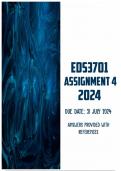, PLEASE USE THIS DOCUMENT AS A GUIDE TO ANSWER YOUR ASSIGNMENT
Please note that the author of this document will not responsibility for any plagiarizing you
commit.
1. Explain why it is important to learn about indigenous knowledge in the curriculum. Provide
examples to support your answers. In your assignment responses include the following:
What is indigenous knowledge.
Why it is important to learn about indigenous knowledge in the curriculum?
Introduction
Indigenous knowledge encompasses the understandings, skills, and philosophies developed by
societies through long histories of interaction with their natural surroundings. This knowledge, often
transmitted orally and through cultural practices, includes local languages, systems of classification,
resource use practices, social interactions, and spiritual beliefs. Integrating indigenous knowledge
into the curriculum is crucial for promoting cultural diversity, sustainable development, and social
justice. This essay explores the importance of incorporating indigenous knowledge in educational
curricula, providing examples to illustrate its benefits.
What is Indigenous Knowledge?
Indigenous knowledge refers to the unique, traditional, and local knowledge existing within and
developed around specific conditions of women and men indigenous to a particular geographic area.
It encompasses a wide range of fields such as agriculture, medicine, and ecological conservation,
often tailored to the local environment and community needs. Indigenous knowledge is characterized
by its holistic approach, where knowledge is interwoven with the community's cultural, spiritual, and
social values.
Importance of Learning Indigenous Knowledge in the Curriculum
Promotes Cultural Diversity and Respect: Incorporating indigenous knowledge into the
curriculum promotes an appreciation for cultural diversity and fosters respect for different
worldviews. Students learn to value the perspectives and contributions of various cultural
groups, which is essential in a multicultural society. This approach helps bridge the gap
between different cultures, fostering mutual understanding and respect. For instance, teaching
about the agricultural practices of indigenous communities can enlighten students on
sustainable farming techniques that have been effective for centuries.
Enhances Environmental Sustainability: Indigenous knowledge systems often include
sustainable practices that have been fine-tuned over generations. These practices can offer
valuable insights into modern environmental conservation efforts. For example, many
indigenous communities have developed methods to manage natural resources sustainably,
which can be integrated into environmental science curricula to teach students about
sustainable development. This knowledge is critical in the context of global challenges such as
climate change and biodiversity loss.
Supports Holistic Education: Indigenous knowledge promotes a holistic approach to
education, integrating intellectual, emotional, social, and spiritual learning. This approach can
enhance students' overall development, fostering critical thinking and problem-solving skills.
For example, the philosophy of ubuntu, which emphasizes communal relationships and mutual




